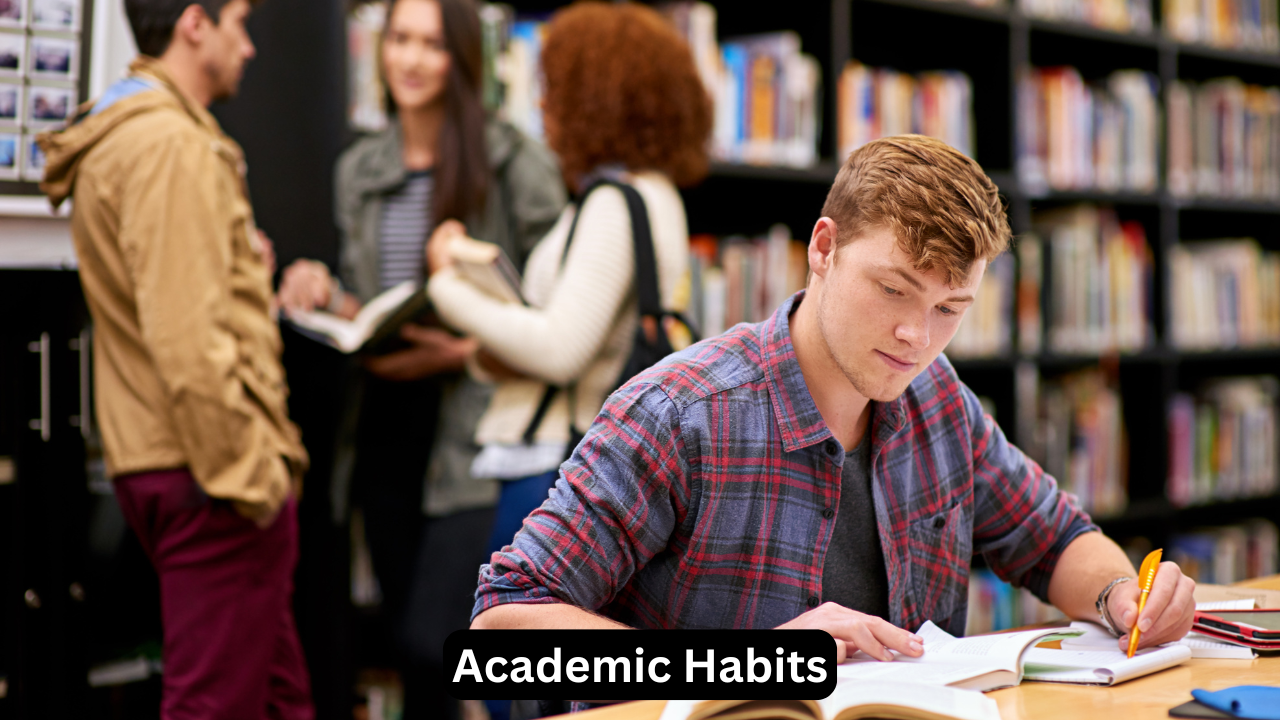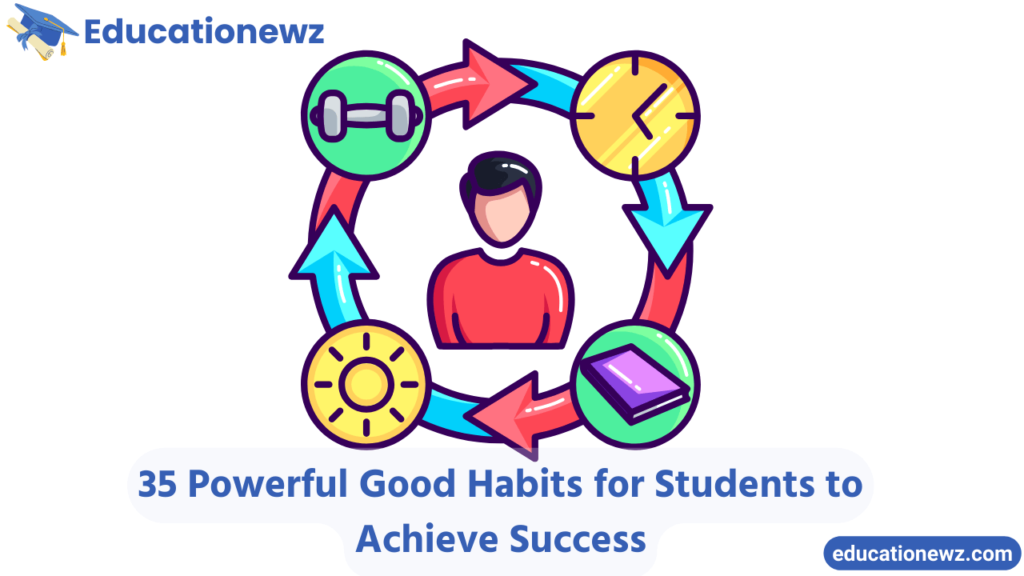Good Habits for Students help improve focus, productivity, and well-being, setting a strong foundation for academic success and personal growth throughout their education and future endeavors.
The life of a student can be a whirlwind of assignments, exams, social events, and personal development. Navigating this busy period successfully requires more than just hard work—it requires cultivating good habits for students that support academic achievement, emotional balance, personal health, and long-term success. In this article, we’ll explore 35 essential habits that can help students enhance their productivity, well-being, and overall success.
Why Good Habits Are Essential for Students
Good habits are the building blocks of success, especially for students. They don’t just keep life organized—they shape your mindset, improve focus, and unlock your full potential. Think of habits as your personal success toolkit—they help manage time, tackle stress, and improve mental and physical health. Developing good habits early fosters discipline, a critical skill for juggling tasks, meeting deadlines, and thriving in academics and beyond. But it’s not just about school—good habits pave the way for a well-rounded, balanced, and fulfilling life.
Habits touch every corner of a student’s life. They can be grouped into key areas: academic, personal, social, emotional, digital, and financial habits. Mastering these areas can create a ripple effect of positive change that extends far beyond the classroom.
Why Good Habits Matter: The Benefits
- Boost Academic Performance: Stay focused, retain more, and excel in exams.
- Reduce Stress and Anxiety: A well-structured routine keeps the chaos at bay.
- Build Confidence: Small wins from good habits lead to bigger successes.
- Master Time Management: Be more productive without feeling overwhelmed.
- Improve Relationships: Healthy habits foster trust, respect, and meaningful connections.
Your habits define your future. Let’s dive deeper into how cultivating good habits can transform your life as a student and set you up for long-term success.
Academic Habits

1. Create a Consistent Study Schedule
A consistent study routine helps students stay organized and ensures that enough time is allocated for each subject. A schedule also reduces procrastination and helps in retaining knowledge.
2. Prioritize Tasks Effectively
Students often face multiple assignments and deadlines. By learning how to prioritize tasks based on urgency and importance, they can reduce stress and stay on top of their work.
3. Take Active Notes During Lectures
Note-taking is one of the most effective ways to engage with content. Active note-taking helps students retain information and provides a valuable resource for review during exams.
4. Set SMART Academic Goals
Setting goals that are Specific, Measurable, Achievable, Relevant, and Time-bound (SMART) can help students stay motivated and focused on their academic pursuits.
5. Seek Help When Needed
Never hesitate to ask for help from teachers, tutors, or peers. Whether you need clarification on a topic or assistance with a project, reaching out for help is an important habit that improves understanding and performance.
Personal Habits

6. Establish a Healthy Sleep Routine
Good quality sleep is essential for memory retention, concentration, and overall well-being. Students should aim for 7-9 hours of sleep each night and establish a consistent bedtime routine.
7. Exercise Regularly
Benefits of Regular Exercise for Students:
| Benefit | Description |
|---|---|
| Improves Mental Clarity | Exercise increases blood flow to the brain, which enhances cognitive function, focus, and memory. |
| Reduces Stress and Anxiety | Physical activity stimulates the release of endorphins, helping to alleviate stress and reduce anxiety. |
| Boosts Energy Levels | Regular exercise improves stamina and energy levels, allowing students to be more productive and alert throughout the day. |
| Improves Sleep Quality | Engaging in physical activity helps regulate sleep patterns, promoting deeper and more restful sleep. |
| Strengthens Immune System | Consistent exercise improves overall immunity, reducing the risk of illness. |
| Boosts Self-confidence | Achieving fitness goals can improve self-esteem and boost confidence. |
| Enhances Mood and Motivation | Regular exercise releases feel-good hormones, improving overall mood and motivation to tackle daily challenges. |
| Improves Physical Health | Exercise helps maintain a healthy weight, strengthens bones, improves cardiovascular health, and promotes muscle strength. |
Physical activity is not only good for your body but also boosts cognitive function and mood. Students should aim for at least 30 minutes of exercise every day, whether it’s a walk, jog, or yoga.
8. Practice Mindfulness
Mindfulness exercises, such as meditation or deep breathing, help students stay focused and calm, reducing stress and improving mental clarity.
9. Eat a Balanced Diet
A healthy diet plays a crucial role in a student’s energy levels and ability to focus. Eating plenty of fruits, vegetables, lean proteins, and whole grains can boost brain function and overall health.
10. Keep a Positive Mindset
Maintaining a positive mindset helps students navigate challenges with resilience. Positive thinking boosts motivation and encourages students to keep going, even when things get tough.
Social Habits

11. Develop Strong Communication Skills
Good communication is essential for academic and social success. Students should practice active listening, clear articulation of thoughts, and empathy during conversations.
12. Build Strong Relationships with Peers
Developing positive relationships with classmates and friends is crucial for emotional support. Building a network of friends can help students in both their academic and personal life.
13. Participate in Group Activities
Collaborating with peers in group projects or extracurricular activities fosters teamwork, social skills, and leadership qualities. It also allows students to gain diverse perspectives.
14. Respect Diversity
Students should be open to learning about different cultures and perspectives. Respecting differences and promoting inclusivity creates a supportive learning environment.
15. Practice Empathy
Understanding and empathizing with others’ emotions and situations can improve social interactions and build deeper connections with classmates.
Emotional Habits

16. Manage Stress Effectively
Learning to manage stress through techniques like deep breathing, meditation, or regular exercise can help students cope with academic and personal pressures.
17. Practice Emotional Regulation
Being aware of your emotions and learning how to regulate them is an important skill. It prevents impulsive reactions and helps students deal with challenges more effectively.
18. Develop Resilience
Life will inevitably throw challenges your way, but students with strong emotional resilience can bounce back from setbacks. Building resilience is key to handling academic stress and personal difficulties.
19. Express Gratitude
Gratitude practices, such as writing down things you are thankful for, can improve mental well-being and foster a positive outlook on life.
20. Engage in Self-Reflection
Taking time to reflect on your actions, decisions, and goals can help students learn from their experiences and grow personally and academically.
Digital Habits

21. Limit Screen Time
Limiting screen time is crucial for students to enhance their focus, reduce distractions, and improve overall well-being. Below are some creative strategies to help manage screen use effectively:
| Tip for Limiting Screen Time | Description | Impact on Routine | Long-Term Effects |
|---|---|---|---|
| Implement the 20-20-20 Rule | Every 20 minutes, take a 20-second break and look at something 20 feet away to reduce eye strain. | Helps maintain focus during study sessions. | Reduces eye strain, improves concentration, and prevents headaches. |
| Create a No-Screen Zone | Designate certain areas (e.g., bedroom, dining table) as screen-free zones to encourage offline activities. | Promotes healthier habits during leisure and sleep time. | Encourages better sleep, reduces dependency on screens, and fosters face-to-face interactions. |
| Use a Screen Time Management App | Download apps to limit screen time or block certain apps during study periods. | Minimizes temptation to use time-wasting apps. | Increases self-discipline, improves time management, and enhances productivity. |
| Set App Usage Goals | Set a limit for non-essential apps (e.g., social media) and track how much time is spent on each. | Helps students be more intentional about their screen use. | Reduces procrastination, fosters more intentional and productive use of time. |
| Engage in Tech-Free Challenges | Participate in weekly or daily challenges to stay away from screens for specific periods (e.g., one hour). | Encourages regular breaks and a balanced lifestyle. | Strengthens willpower, improves mental clarity, and enhances creativity. |
While technology is an essential tool for students, excessive screen time can be a major distraction. Setting limits on social media usage and unnecessary browsing can help improve focus and productivity.
22. Set Digital Boundaries
Students should create boundaries between study time and leisure time. Using apps like Forest can help students stay focused by blocking distracting websites during study sessions.
23. Organize Digital Files
Staying organized digitally by categorizing files into folders can save time and reduce stress when searching for important documents.
24. Practice Safe Online Habits
Students should practice online safety by avoiding suspicious links, protecting their personal information, and respecting privacy when using digital platforms.
25. Use Educational Apps Effectively
Apps like Quizlet, Evernote, and Google Drive can help students organize their notes, create flashcards for review, and keep track of assignments.
Financial Habits

26. Create a Budget
Financial management is an essential skill for students. Creating a budget helps students track their spending and avoid unnecessary expenses, enabling them to save for the future.
27. Save Money Regularly
s ensure financial independence and prepares them for unexpected expenses. Below are some effective tips for saving money:
| Money Saving Tip | Description | How to Implement | Benefits |
|---|---|---|---|
| Create a Budget | Track income and expenses to understand where money is going and identify areas to cut back. | Set a weekly or monthly budget and stick to it. | Increases financial awareness, prevents overspending, and improves financial control. |
| Automate Savings | Set up automatic transfers to a savings account to make saving a consistent habit. | Set up an automatic transfer on your payday to save a fixed amount. | Makes saving effortless, builds a habit, and helps ensure savings growth. |
| Cut Unnecessary Subscriptions | Review subscriptions like streaming services, gym memberships, or apps that aren’t being fully utilized. | Cancel or pause any subscriptions you don’t use frequently. | Reduces unnecessary expenses and increases savings potential. |
| Pack Your Own Meals | Cooking at home is cheaper than eating out or ordering takeout. | Plan and prepare meals in bulk to avoid costly food expenses. | Saves money, promotes healthier eating, and reduces dependency on takeout. |
| Buy Used or Discounted Items | Look for second-hand items or wait for sales and discounts before making purchases. | Check thrift stores, online marketplaces, or discount stores. | Saves money on essentials and reduces impulse spending. |
| Set Financial Goals | Set specific savings goals for short-term or long-term needs, like emergency funds or big purchases. | Break down large goals into smaller, more achievable targets. | Provides motivation to save, creates purpose for saving, and helps track progress. |
| Use Cash Instead of Cards | Use cash for daily purchases to prevent overspending and keep track of how much is being spent. | Withdraw a fixed amount each week for spending and avoid using cards. | Makes it easier to stick to a budget and limits impulsive purchases. |
Developing a savings habit, even with small amounts, helps students become financially independent and prepared for unexpected expenses.
28. Distinguish Between Needs and Wants
Learning to differentiate between needs and wants allows students to make better financial decisions and avoid impulsive spending.
29. Track Your Expenses
Students should track their spending to ensure they stay within budget. Using financial tracking apps can simplify this process and promote smart spending habits.
30. Learn About Financial Literacy
Developing financial literacy by reading books or attending workshops on personal finance can help students make better decisions about managing their money.
Bonus Habits

31. Maintain a Clean Study Space
A tidy and organized study environment helps students stay focused and productive. Students should regularly clean their study space to reduce distractions.
32. Learn Time Management Techniques
Mastering time management skills, such as the Pomodoro Technique, helps students break study sessions into focused intervals, improving concentration and efficiency.
33. Stay Open to Feedback
Being open to feedback from teachers, peers, and family helps students improve their academic and personal development. Constructive criticism is an opportunity for growth.
34. Develop a Growth Mindset
Students with a growth mindset believe that their abilities can improve with effort. This mindset encourages persistence and reduces the fear of failure.
35. Engage in Extracurricular Activities
Participating in extracurricular activities like sports, music, or volunteering enhances social skills, provides stress relief, and fosters a sense of community.
FAQs on Good Habits for Students
1. Why are good habits important for students?
Good habits help students stay organized, reduce stress, and enhance their overall productivity. By developing good habits, students can achieve academic success and lead a more balanced life.
2. How can students develop good study habits?
Students can start by creating a consistent study schedule, taking active notes during lectures, and setting SMART goals for their academic progress.
3. What are the best personal habits for students?
Key personal habits for students include maintaining a healthy sleep routine, exercising regularly, practicing mindfulness, and eating a balanced diet.
4. How can students improve their financial habits?
Students can improve their financial habits by creating a budget, saving money, distinguishing between needs and wants, and tracking their expenses regularly.
5. What are the benefits of a positive mindset for students?
A positive mindset helps students stay motivated, reduces stress, and encourages resilience in the face of challenges, contributing to both academic and personal success.
Conclusion
Incorporating good habits for students is essential for creating a structured and fulfilling academic life. Whether it’s developing a consistent study routine, managing emotions, or maintaining financial responsibility, each habit contributes to building a well-rounded, successful student. Starting small and staying consistent will help students reap the benefits of these habits, setting them up for success in school and beyond. Please follow our blog Educationewz.



